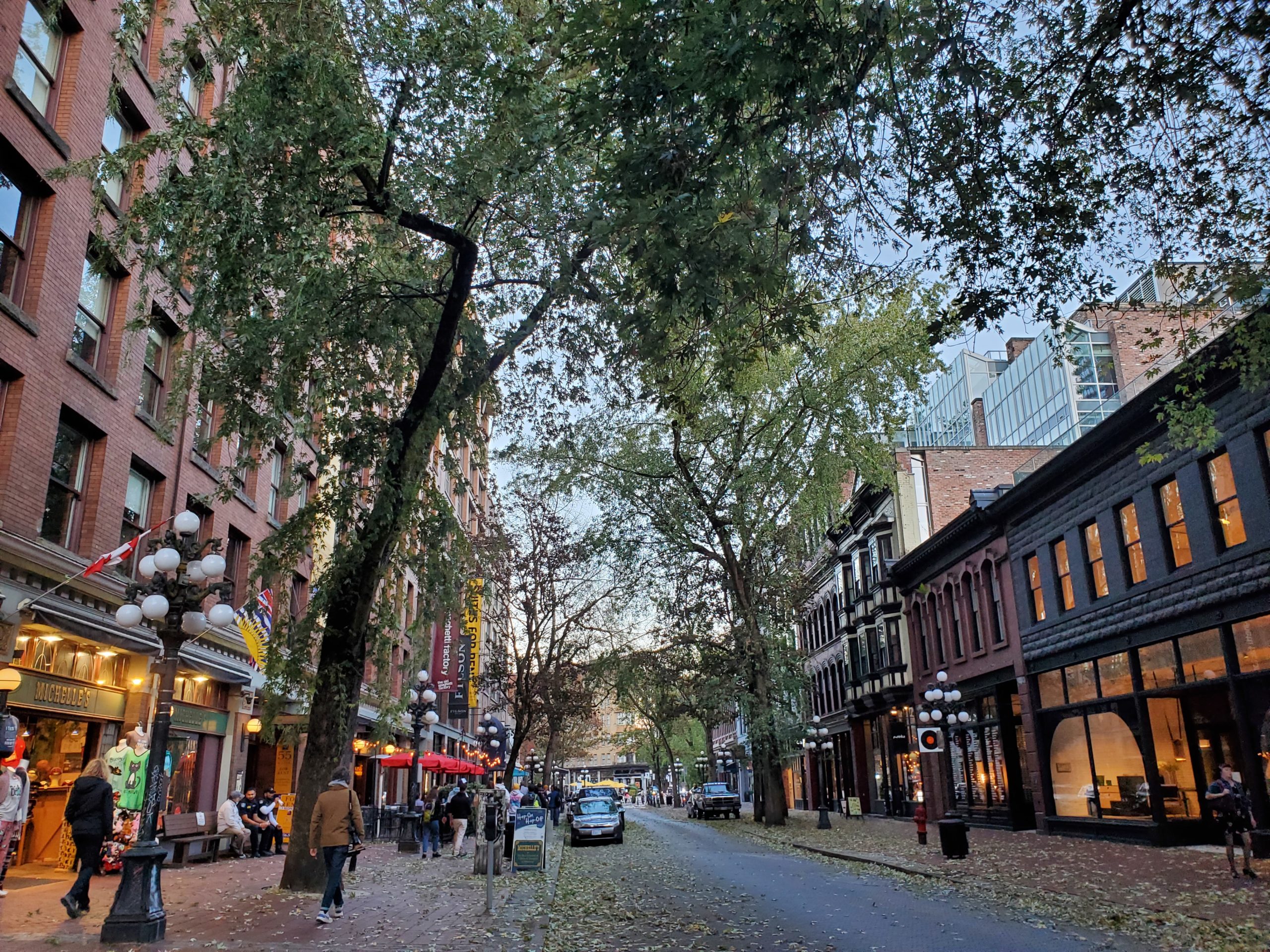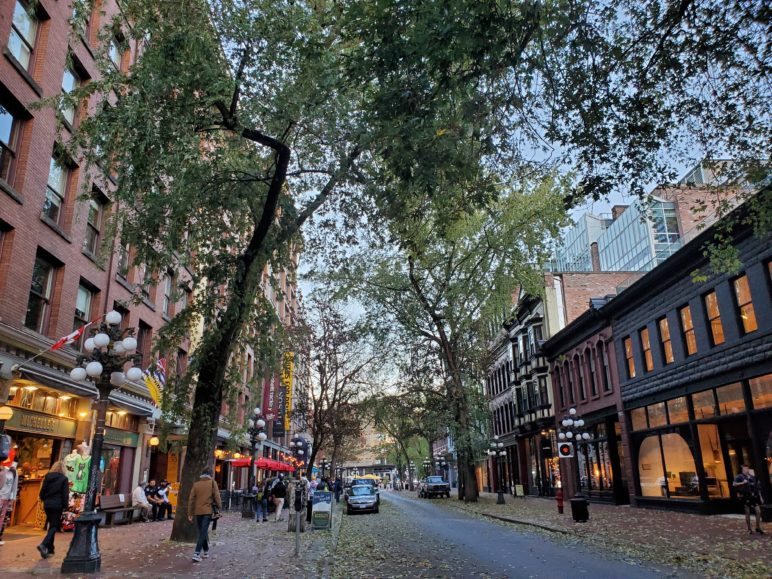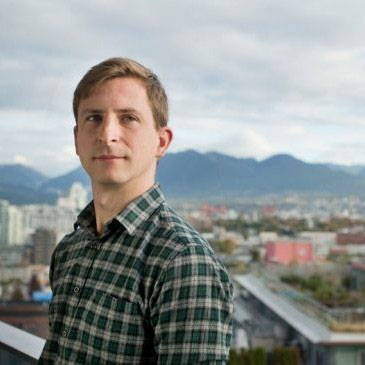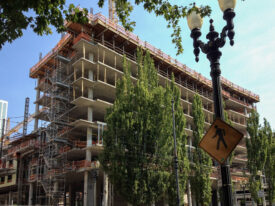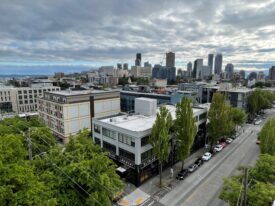Which North American city will be the first to address its housing crisis with abundant apartments, city-wide?
A growing handful of North American states and major cities have been scoring wins in the battle to undo the historic scourge of exclusionary zoning laws, notably Oregon, California, Massachusetts, Portland, Vancouver, BC, Minneapolis, and most recently, Charlotte. These are all relatively incremental changes, though. Laneway cottages here, and duplexes or quadplexes there. None permit even small apartment buildings city-wide.
But in the lead-up to the Vancouver, BC, October 15, 2022, election, municipal parties are competing to outdo each other with proposals to legalize apartments. With an influx of bold housing plans in recent months, Vancouver could be the first North American city to really undo exclusionary zoning. It could achieve, across all of its 115 square kilometers, the holy grail: re-legalizing neighborhoods that mix residential and commercial in a vibrant combination. “Four floors and corner stores.” Or maybe even six.
These are uncharted waters; no city has ever undone restrictive zoning on this scale. According to Jill Atkey, CEO of the BC Non-Profit Housing Association,
It would signal to other cities struggling with the housing crisis in the way Vancouver is, that we have elected officials that are really, really serious about tackling the housing crisis. And then, over time, we could potentially—now, it’s always a struggle, because Vancouver is one municipality in a region of 21 municipalities—but in combination with what [the Provincial government] is proposing, you could demonstrate that more supply could have a positive impact on rents. It could be a game-changer in many ways.
If Vancouver adopts one of these proposals, it could open the floodgates, creating a template for other cities to follow, from coast to coast.
An “emerging consensus” on zoning reform
In Vancouver, densifying detached-home neighborhoods has gone from a political third rail, only a few years ago, to a banner that multiple parties are competing to claim. Atkey, for her part, says:
I honestly didn’t think it would happen this election. Maybe perhaps the next one. Because in 2018 we had OneCity proposing ‘every neighborhood for everyone’ and various housing forms in all neighborhoods, but they were pretty much the standalone in 2018. Now we’ve got One City, Progress Vancouver, Vision—all talking about densifying single-family neighborhoods. So there does seem to be, almost, an emerging consensus.
Following public sentiment, Vancouver’s politicians are suddenly thinking really big on housing.

Perhaps it shouldn’t be so surprising, given that zoning reform is immensely popular with the public. A 2019 Research Co poll, for example, found that 71 percent of Vancouver residents would support 3–4-story apartments in neighborhoods that currently only permit detached houses.
This shift in public and political opinion makes sense. Who can afford a detached home in Vancouver today? The price is $1.8 million on the city’s more affordable east side, and $3.4 million on the west. Following public sentiment, Vancouver’s politicians are suddenly thinking really big.
OneCity
OneCity wants to “end the apartment ban” and permit new rental buildings of up to six stories in what it terms “formerly exclusive areas of the city.” The party would also permit stacked condo buildings of up to four stories across the city. OneCity leaders criticize the past practice of confining rental buildings to busy streets and setting aside quiet streets for the wealthy. They would also delegate many housing development approvals to staff, acknowledging that holding a lengthy public hearing for every project is inefficient and costly.
OneCity has one incumbent city councillor and seeks to elect four.
Forward Together
Vancouver’s incumbent mayor Kennedy Stewart and his Forward Together party want to build 220,000 homes over ten years, increasing the city’s total housing supply by 67 percent. This would mostly be rental and below-market-rate housing, with 140,000 units of these types. Forward also pledges to allow ground-oriented six-plexes on every residential lot in the city. Forward does not explicitly say where it might permit apartment buildings, but its housing target is so high that, according to Atkey, it could be seen as “a tacit endorsement of densifying single-family neighborhoods.”
Forward Together is running six new candidates for Council, as well as one for mayor.
Progress Vancouver
Progress Vancouver’s housing platform would also “end the ban on affordable, multi-family rentals,” allowing six-story rentals and four-story ownership buildings throughout the city. Like OneCity, Progress would “stop forcing construction of rental housing on noisy and polluted arterial roads.” Progress would set a target of 15,000 new homes per year for the city.
Progress is running six candidates for council, and one for mayor, and has no incumbents.
Vision Vancouver
Vision Vancouver, which had a majority on Council from 2008–2018 and is attempting a comeback in 2022, has a plan to vote on city-wide rezoning within 90 days of taking office and to “open up all neighborhoods to low- and mid-rise homes.”
Vision Vancouver is running three council candidates, and has no incumbents.
“The choice is over whether we want to be building a suburban lifestyle that’s not healthy for families, that’s not healthy for the economy, that’s not healthy for the climate.” –Progress Vancouver mayoral candidate Mark Marrissen
It seems like every week in the lead-up to the October 15 election, one of these parties has announced some new housing policy that would have sent heads spinning in 2015, or even in 2018. According to mayoral candidate Mark Marissen, running with Progress Vancouver:
Four years ago, allowing duplexes everywhere was considered radical. That was only four years ago. So that just shows that the world is changing quickly. And I believe that we were really on to something four years ago, and this is the way things will go in the rest of North America over time. Because the choice is over whether we want to be building a suburban lifestyle that’s not healthy for families, that’s not healthy for the economy, that’s not healthy for the climate.
Supporting both market-rate and subsidized housing
One aspect shared by many of these plans is a focus on the overall housing supply, accompanied by a priority for nonprofit, below-market-rate housing. As Vancouver-based economist Alex Hemingway recently wrote in Jacobin, “If a plan to add new social or nonmarket housing isn’t big enough to drive down rents for those who are stuck in market-rate units, it’s too small and needs to be expanded.”
These plans would promote non-profit developments in two ways. First, multifamily nonprofit developments are currently restricted to those small slivers of land that are zoned for apartments. As social housing developer Helen Lui explains:
A lot of organizations, for example, already own housing. They might own a couple of units in a bunch of different buildings…. A lot of that exists, and a lot of them have the capacity to look at redevelopment to add more. But right now they’re in a detached zone. There’s nothing they can do other than a rezoning, but it’s just not feasible.
Not feasible because the city’s rezoning process to make a special allowance for multifamily projects can cost between $500,000 and $1 million, according to Atkey. Opening up the whole city to apartments also opens it up to nonprofit affordable housing.
Second, some of these plans go further by creating special rules to promote nonprofit development. OneCity’s plan, for example, would “stack the deck” for social housing by allowing it extra height and density and expediting its permitting.
Many parties, many plans
At this point, we should pause to explain why there are so many different plans from so many different parties. Vancouver’s fecund political ecosystem produces a broad array of homegrown political parties. In the last municipal election in 2018, Vancouverites elected four different parties to its ten-member council, as well as an independent mayor. Things have only become more complicated since then.
The Non-Partisan Association, after electing a plurality of five councilors in 2018, has split into three different parties. Incumbent mayor Kennedy Stewart has started a new party: Forward Together. The Vision Vancouver party, which ruled Vancouver with majority councils from 2008–2018, is attempting a comeback with three council candidates. And long-time Liberal Party political consultant Mark Marissen is running for mayor with his new Progress Vancouver Party.
This all adds up to nine fairly plausible parties running for just ten council spots and one mayor’s seat. Vancouver’s at-large, first-past-the-post voting system for council makes it difficult to predict the results. In this system, the exact breakdown in votes between somewhat similar parties can make a big difference in which candidates end up being elected.
This is why there are so many plans, why they’re so bold, and why candidates are talking about them more than ever before. Whether it’s OneCity’s “six floors and corner stores,” Forward Together’s 220,000 new homes, Vision Vancouver’s promise to end the apartment ban in 90 days, or Progress’s promise to “end the ban on multi-family rental units,” the outcome could be radical: the end of the apartment ban in Vancouver.
And that’s not all. In addition to these municipal hopefuls’ aggressive stances, there are also some (dimmer but real) sparks of hope from other parties. The Vancouver Greens’ Michael Wiebe has proposed pre-approving certain building forms as a “new Vancouver special,” making multi-family housing as easy to build as single-detached homes. A new city-wide plan, approved by a majority of the current City Council, promises to eventually spread “more housing options across all neighborhoods.” And at the Provincial level, the “overwhelmingly likely” choice for next premier of British Columbia, David Eby, is promising to set “minimum standards” for density in cities, and to allow three homes on every single-family lot across the province.
Vision Vancouver council candidate Lesli Boldt speaks of a “growing consensus supporting zoning reform that will make this possible amongst most municipal parties.” And while there is a lot of uncertainty about just which party might lead the charge, it is almost certain that some of these hopefuls will get elected and push for zoning reform more ambitious than any North American city has ever seen.
Vancouver’s future depends on today’s voters
One sign of any ecosystem or city’s health is the status of its young. The number of children in most Vancouver neighbourhoods has declined over the past twenty years. And the decline has not been uniform: in neighborhoods that added housing, more children appeared, while in neighborhoods that did not build, children grew up and moved away, without being replaced by new generations.
“Whether or not we’re going to see ‘four floors and corner stores’ throughout the city, that will be up to the voters.” –Jill Atkey, CEO of the BC Non-Profit Housing Association

Vancouver is also an increasingly difficult place for people in their 20s, leading to what the Globe and Mail’s Erica Alini calls “a rapid cultural shift about what society should expect of young adults and what they can expect of themselves.” It should be no surprise that the rapid decline in the prospects of entire generations has led to a rapid shift in the accepted wisdom on land use reform. And so here we are, maybe, on the cusp of the unprecedented: the end of an apartment ban in a North American city.
Vancouver has a real chance to do something that hasn’t been done in Canada or the USA in at least 100 years: build a walkable, dense, transit-oriented city, full of street trees, welcoming apartments, and accessible and affordable multi-generational living. And most of the parties in front of Vancouver voters this fall are clamoring to claim that they’re the ones who can and will do it. There are no guarantees that these parties will be successful or that, if elected, they will follow through with the letter or spirit of their housing platforms, but their plans are encouraging: Vancouver has never before seen such energy for legalizing more homes.
In choosing which parties and candidates might be the most reliable zoning reformers once in office, Atkey says to pay attention to the details: “Talking about where and how [to build] is really going to convince voters that a party is serious about housing and knows how to achieve those targets. So whether or not we’re going to see ‘four floors and corner stores’ throughout the city, that will be up to the voters.”

